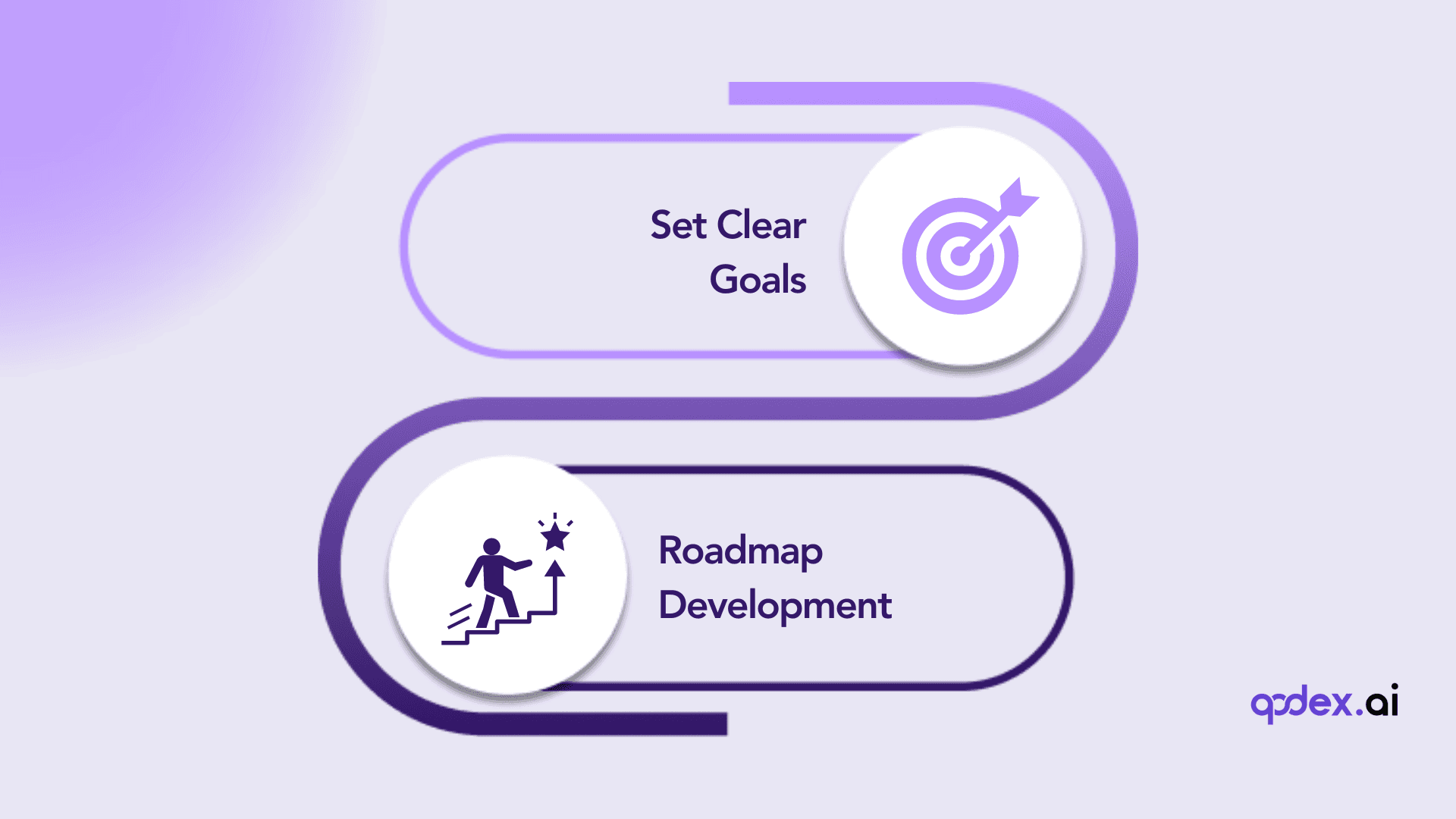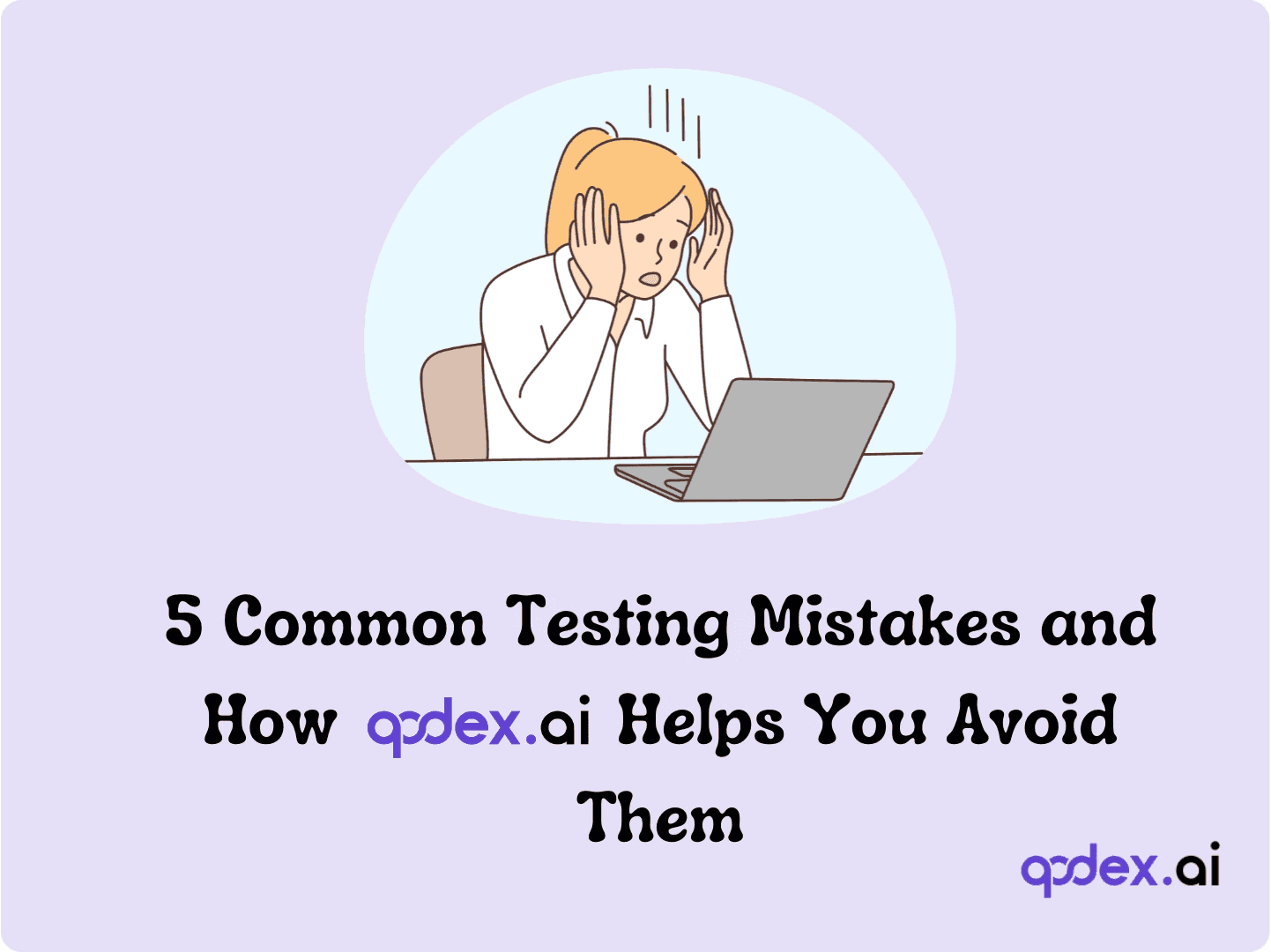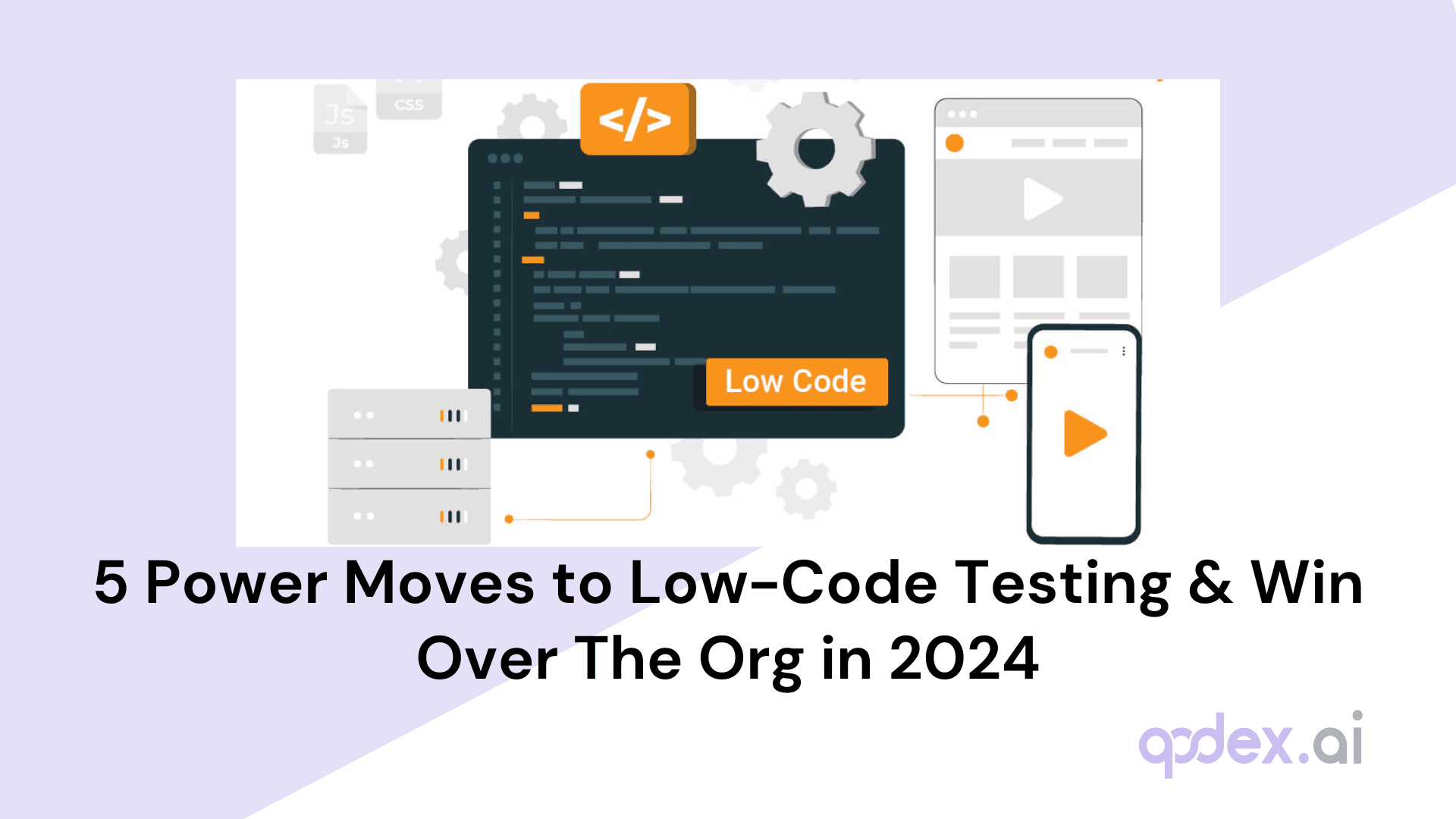AI Testing: The Future of Software QA Tools
Introduction
The realm of software quality assurance (QA) is undergoing a remarkable transformation, driven by the rapid advancements in technology.
AI Testing, a groundbreaking approach leveraging artificial intelligence, is redefining traditional testing methods to offer unparalleled efficiency, accuracy, and scalability.
This blog dives into the future of AI Testing, exploring its benefits, the innovative tools propelling this change, and the best practices to adopt for maximizing its potential.
What is AI Testing?
AI Testing is the practice of utilizing artificial intelligence (AI) techniques to automate, optimize, and enhance various aspects of the software testing process.
AI Testing involves applying machine learning, natural language processing, and other AI-driven techniques to improve accuracy, coverage, efficiency, and overall software quality in testing.
Proactive Issue Detection with Predictive Analysis
One of the key advantages of AI Testing is its ability to perform predictive and path analysis. By examining historical data and real-time test results, AI-powered tools can proactively identify areas of an application most likely to fail. For instance, in a cloud-based project management platform, AI can highlight high-risk components before issues ever reach end-users. This allows QA teams to strategically focus their efforts on the most critical parts of the system, resulting in improved stability and performance.
By leveraging these intelligent insights, organizations can deliver more reliable software and a smoother user experience.
What is AI Testing?
AI Testing refers to the use of artificial intelligence techniques to automate and enhance the software testing process.
By utilizing advanced algorithms and machine learning models, AI Testing aims to improve the accuracy, coverage, and efficiency of testing activities, ensuring higher quality software products.
How AI Testing Improves Software Quality
AI Testing enhances software quality by using intelligent systems to analyze vast amounts of data, identify patterns, and predict potential defects.
This results in a more thorough testing process that can adapt to new changes quickly and efficiently, reducing the chances of bugs and errors slipping through the cracks.
Difference Between AI Testing and Traditional Software Testing
Traditional software testing often relies on manual efforts and predefined test scripts, which can be time-consuming and prone to human error. In contrast, AI Testing automates repetitive tasks, learns from past data to optimize test cases, and continuously adapts to changes, making it more efficient and reliable.
By leveraging AI Testing, organizations can achieve faster release cycles, improve product quality, and ensure a seamless user experience.
Benefits of AI in Software Testing
Enhanced Accuracy through Pattern Recognition and Data Analysis
AI testing tools use advanced pattern recognition and data analysis to detect anomalies and predict potential issues. This improves the accuracy of test results by identifying defects that might be missed by traditional testing methods.
Expanded Test Coverage with Adaptive Learning
AI can adapt to changes in the application, ensuring comprehensive test coverage. This means that new features and updates are automatically included in the testing process, reducing the risk of undetected bugs.
Efficient Test Creation by Automating Repetitive Tasks
AI-driven tools automate repetitive testing tasks, freeing up QA engineers to focus on more complex issues. This not only speeds up the testing process but also reduces human error, ensuring more reliable results.
Effortless Test Maintenance with Automatic Adaptation
One of the significant challenges in traditional testing is maintaining test scripts as the application evolves. AI testing tools automatically adapt to changes in the application, ensuring that test scripts remain up-to-date and effective without extensive manual intervention.
By integrating AI into software testing, organizations can achieve higher efficiency, better accuracy, and more comprehensive test coverage, ultimately leading to improved software quality and faster release cycles.
The Advantages of Natural Language Programming and Low-Code in AI Testing Tools
Adopting natural language programming and low-code testing approaches is rapidly shifting the landscape of QA, making high-quality automation accessible to a much broader team.
With natural language programming, even non-technical stakeholders can write test cases in plain English. This means Product Managers, QA analysts, and other team members can quickly describe expected software behaviors without having to learn a scripting language. The result? Faster test creation, improved communication across teams, and dramatically shortened onboarding times for new team members.
Low-code platforms take this a step further by allowing testers and developers to generate, modify, and maintain complex test scenarios with simple point-and-click interfaces or minimal scripting. Here are some clear benefits of these approaches:
Broader Team Involvement: Test creation and maintenance are no longer bottlenecked by the availability of expert automation engineers. Anyone familiar with the application’s business logic can contribute, leading to better coverage and fewer gaps.
Accelerated Testing Cycles: Without the overhead of traditional scripting, test cases can be written or updated in minutes, keeping up with the rapid pace of modern deployments and iterative development cycles.
Automatic Adaptation to Change: Many low-code and natural language platforms leverage AI for “self-healing” tests, which automatically adapt to changes in application UI—so your tests are far less likely to break every time a button moves.
Reduced Maintenance Burden: By minimizing manual coding and enabling natural expressions of test logic, these tools significantly cut down on the time spent fixing and updating tests, especially in fast-evolving projects.
Seamless Integration with DevOps: Many of these solutions offer built-in integrations for CI/CD pipelines, making continuous testing easier to implement and scale.
Ultimately, natural language and low-code approaches democratize test automation, empowering diverse teams to collaborate—and accelerating the path to consistently reliable, bug-resistant software.
When evaluating an AI testing tool, you’ll want to look beyond the basics. Prioritize solutions with self-healing capabilities—these automatically update your tests when your UI changes, saving you from constant manual maintenance. Robust element identification is key as well, ensuring your tests don't break with minor application updates. Visual testing features help catch UI discrepancies early, and natural language test creation makes it easy for anyone on your team to build and understand tests. Finally, seamless integration with your existing CI/CD pipeline ensures your testing keeps pace with development, supporting a smooth and efficient workflow.
Types of AI Testing
Unit Testing: Ensuring Each Part Functions as Intended
Unit testing focuses on verifying individual components or units of the software to ensure they work as expected. AI can enhance unit testing by automatically generating and executing tests for each module, identifying potential issues early in the development process.
Integration Testing: Verifying Component Interactions
Integration testing ensures that different modules or services within an application interact correctly. AI tools can simulate various integration scenarios, automate the execution of integration tests, and detect issues in the interactions between components.
System Testing: Checking Overall Stability and Functionality
System testing evaluates the complete and integrated software system to ensure it meets the specified requirements. AI-driven system testing tools can conduct extensive end-to-end tests, automatically generating test cases based on user behavior and system specifications.
User Acceptance Testing (UAT): Ensuring the Software Meets User Needs
User Acceptance Testing involves verifying that the software meets the end-users' needs and requirements. AI can assist in UAT by simulating real user interactions, providing insights into user experience, and ensuring that the software performs as expected in real-world scenarios.
Top AI Testing Tools
AI-powered software testing tools are designed to strengthen test automation and efficiency across a wide range of testing needs. Each tool brings unique capabilities, specializing in various aspects of the software testing lifecycle—from functional and regression testing to performance and usability, supporting everything from agile development teams to complex enterprise environments.
Qodex.ai
Overview: Qodex.ai is an AI-driven automation testing tool designed to provide comprehensive and continuous test coverage. Its advanced AI capabilities make it particularly user-friendly, especially for beginners who may not have extensive coding skills.
Features:
AI Software Test Engineer: Automates the creation and maintenance of test cases.
Contextual Intelligence: Personalizes test cases based on product documentation and codebase.
Continuous Test Coverage: Ensures exhaustive testing with minimal manual intervention.
Seamless Integration: Compatible with popular CI/CD pipelines and development tools.
Scalability: Easily scales to handle growing project needs.
AI Capabilities:
Knowledge Base Sharing: AI agent builds a knowledge base from product docs, code, and engineering systems.
Exhaustive Test Suite: AI-generated exhaustive test suite that QA Engineers can review and refactor using natural language conversations.
API and UI Testing: Maintains exhaustive functional test cases and covers penetration, security, compliance, and load testing.
Read more about Qodex here: https://qodex.ai/blog/automate-api-testing-with-ai-in-30-minutes
Why It Stands Out: Qodex.ai stands out due to its AI-driven approach, which simplifies the testing process and provides robust test coverage. Its integration capabilities and continuous test maintenance make it an ideal choice for teams looking to enhance their testing efficiency and quality.
Alongside Qodex, several leading AI-powered testing solutions further demonstrate the breadth and capability of modern testing platforms:
Self-Healing Test Scripts: Platforms like Virtuoso QA use AI and machine learning to automatically adjust tests when interface elements change, minimizing maintenance even as applications evolve.
Natural Language Test Creation: Some tools eliminate the need for coding altogether, allowing teams to build functional UI tests with simple, human-readable commands.
Comprehensive Test Scheduling and Execution: Automated scheduling features allow tests to run at optimal times, with intelligent systems prioritizing the most impactful tests for each build.
Cross-Browser and Mobile Testing: Solutions such as Sauce Labs support a wide variety of environments, ensuring consistent performance and appearance across devices and browsers.
Visual and API Testing Enhancements: By integrating visual validation and robust API testing, modern platforms help catch design and functional issues early, improving software reliability and user experience.
Insightful Reporting and Debugging Tools: Detailed dashboards and AI-generated insights simplify root cause analysis, helping teams quickly resolve issues before they affect end users.
By integrating Qodex, teams can streamline their AI testing processes, achieve higher accuracy, and ensure their software meets all requirements. These capabilities, paired with the strengths seen in other leading platforms, empower development teams to deliver robust, high-quality software faster and with greater confidence.
2. Testsigma
Overview: Testsigma is a cloud-based test automation platform that enables users to automate their API tests without needing any coding skills. Its user-friendly interface and powerful features make it a popular choice for beginners.
Features:
AI-Powered Automation: Speeds up test creation and execution with intelligent, self-healing scripts.
Real-Time Validation: Instantly assesses API responses, detecting issues as soon as they arise.
Data-Driven Testing: Easily test multiple scenarios and edge cases by running scripts with variable datasets.
Continuous Integration Support: Integrates smoothly with CI/CD pipelines for uninterrupted feedback.
Chained API Workflows: Validates sequences of API calls to ensure complete and reliable workflows.
Codeless Test Building: Enables non-coders to design robust tests with a user-friendly interface.
Wide Method Compatibility: Supports a variety of API request types for comprehensive coverage.
Why It Stands Out: Testsigma's natural language processing capabilities make it extremely accessible for users without coding experience. Its comprehensive feature set and seamless integration with other tools make it a robust solution for beginners.
3. Postman
Overview: Postman is a versatile API testing tool known for its powerful and user-friendly interface. It supports the development, testing, and monitoring of APIs across various platforms.
Features:
Automated Testing: Allows users to automate tests and create complex scenarios.
Collaboration Tools: Facilitates team collaboration with shared workspaces and collections.
Mock Servers: Enables users to simulate API endpoints for testing.
API Documentation: Automatically generates API documentation.
Mock External Services
When testing APIs, it's important to simulate interactions with external APIs or third-party services. Postman supports this by letting you create mock servers that mimic real-world scenarios, helping you validate your API's behavior under different conditions. Additionally, you can use dedicated mocking tools like WireMock or Mockoon to create realistic mocks, making it easier to test your API's resilience and error handling before going live.
Why It Stands Out: Postman is renowned for its versatility and ease of use. Its collaboration features and extensive API documentation capabilities make it a favorite among teams.
Katalon Studio
Overview: Katalon Studio combines automation with AI enhancements, offering a comprehensive, scalable solution for testing REST, SOAP, and GraphQL APIs.
Features:
Integrated Development Environment (IDE): Feature-rich environment for scripting, debugging, and test maintenance.
Robust Test Support: Handles various API protocols, seamless imports from tools like Swagger and Postman, and supports modern frameworks.
Data-Driven Capabilities: Enables broad test coverage with multiple data sources and managed datasets.
BDD and Gherkin Support: Aligns with modern test principles for readable, accessible scenarios.
Scalable Testing Infrastructure: Runs tests locally or remotely, fits into Docker and CI/CD environments, and manages complex scenarios with reusable components.
Why It Stands Out: Katalon Studio is lauded for minimizing maintenance, providing full lifecycle management, and supporting advanced workflows without sacrificing ease of use.
mabl
Overview: mabl blends low-code automation with AI, making API validation accessible and scalable—perfect for teams looking to bridge UI and API testing in one platform.
Features:
Seamless Imports: Quickly pull in Postman Collections and run tests at scale.
Low-Code Setup: Simplifies creation and maintenance of data-driven API scenarios, so both beginners and testers can ramp up quickly.
Unified Testing Platform: Combines UI and API tests under a single dashboard for unified reporting and analysis.
Parallel Test Execution: Optimizes regression cycles by supporting unlimited parallelism.
Why It Stands Out: mabl's integration of low-code, AI, and real-time feedback makes end-to-end validation manageable and swift, especially for web applications.
6. SoapUI
Overview: SoapUI is a widely-used open-source API testing tool specialized in testing REST, SOAP, and GraphQL APIs. It offers automated tests and a graphical interface, making it accessible for beginners.
Features:
Automated Testing: Supports the creation and execution of automated tests.
Graphical Interface: User-friendly interface for easy test creation.
Protocol Support: Comprehensive support for REST, SOAP, and GraphQL APIs.
Functional Testing: Offers powerful tools to test all aspects of REST and SOAP APIs, ensuring thorough validation of your endpoints.
Load Testing: With SoapUI Pro, you can quickly create and execute load tests to gauge the performance of your APIs under various conditions.
Security Testing: Provides detailed security testing capabilities to verify your APIs are safeguarded against common vulnerabilities.
Data-Driven Testing: Allows for testing with different sets of input data, boosting coverage and reliability.
Scripting Support: Facilitates complex, data-driven, and reusable test scripts, enabling advanced testing scenarios.
Open Source: Freely accessible to the community, which drives continuous enhancements and collaborative problem-solving.
Why It Stands Out: SoapUI's extensive protocol support and user-friendly graphical interface make it a robust tool for comprehensive API testing. Its open-source nature also provides flexibility and customization options. The combination of functional, load, and security testing—plus the ability to write custom test cases—means both beginners and advanced users can tailor their workflow to fit virtually any testing need.
7. REST-assured
Overview: REST-assured is a powerful Java-based framework designed for testing RESTful APIs. It is ideal for developers familiar with Java and looking for a flexible and robust testing tool.
Features:
Java-Based: Leverages Java for creating and executing API tests.
BDD Syntax: Supports Behavior Driven Development (BDD) style syntax.
Integration: Easily integrates with existing Java projects and testing frameworks.
Why It Stands Out: REST-assured is particularly suited for Java developers, providing a flexible and powerful framework for API testing. Its BDD syntax makes it easy to write readable and maintainable tests.
Pricing:
Open-Source: Free to use.
Pros:
Popular choice among Java developers for its natural integration into existing projects.
Great support for complex API workflows, including authentication and parameterization.
Free to use and actively maintained.
Cons:
Suited primarily for Java users; not readily accessible to testers accustomed to other programming environments.
Requires some coding proficiency, which may present a hurdle to non-developers.
Not geared towards performance or UI-based API testing.
8. GoRest
Overview: GoRest is a freely available platform crafted for those who want hands-on experience with RESTful API services. Its straightforward approach makes it suitable for both those honing their API skills and professionals seeking a flexible testbed.
Features:
Ideal for Learners: GoRest offers a safe environment to experiment with real API requests, making it an excellent resource for anyone exploring how RESTful APIs work.
Versatile Endpoints: Users can practice sending a full range of HTTP requests—such as GET, POST, PUT, PATCH, and DELETE—against multiple types of example data.
Rich Data Sets: The platform provides realistic dummy data including users, posts, comments, and more, enabling comprehensive practice scenarios.
No Cost Access: With its open and free-to-use model, GoRest is readily accessible to students, testers, and developers looking to experiment without barriers.
Why It Stands Out: GoRest distinguishes itself as both a learning tool and a robust playground for API testers. Its accessible endpoints and variety of sample data allow users to simulate real-world requests and responses, building confidence and technical know-how with zero setup required.
Rainforest QA
Overview
Rainforest QA sets itself apart with a strong focus on visual-driven, end-to-end test automation tailored for web applications. Unlike traditional code-centric solutions, it employs a no-code, English-language scripting system and interacts directly with the app’s visual interface—mirroring real user actions rather than operating behind the scenes in the codebase.
Features
Visual-First Testing: Executes tests visually, ensuring UI elements function as intended from a real user’s perspective.
Multi-Method Element Identification: Uses layered identification techniques, increasing resilience when application layouts change.
Self-Healing AI: Automatically adapts to interface changes, minimizing disruptions and ongoing manual maintenance.
Dedicated Test Manager: Each account is paired with a specialist who handles test creation, maintenance, and filters out false positives, streamlining QA workflows.
Lightning-Fast Cloud Execution: Tests run in parallel on cloud infrastructure, delivering results in minutes, regardless of scale.
Pros
Highly intuitive no-code interface accessible to non-developers.
Robust handling of UI changes thanks to its self-healing capabilities.
Rapid feedback loops due to fast, scalable cloud test execution.
Cons
Primarily focused on visual/UI testing.
May be overkill for strictly backend or API-driven projects.
By leveraging these AI-powered tools, teams can significantly enhance their software testing processes, achieving greater accuracy, efficiency, and reliability in their QA efforts.
Checksum
Overview
Checksum harnesses the power of AI to simplify and automate the toughest parts of end-to-end testing. By watching real user sessions and analyzing how people naturally interact with your app—including those “well, that’s unexpected” edge cases—it automatically generates relevant tests in formats like Playwright or Cypress, so you don’t have to painstakingly write and update them yourself.
Features
AI-driven test discovery that monitors actual user flows and even mines help center docs to map out realistic, high-coverage test paths.
Lightning-fast, single-click creation of entire test suites using plain English descriptions of expected flows—no need to wrestle with scripting for every small scenario.
Self-healing tests that adjust themselves as your application evolves, minimizing maintenance headaches when buttons move or logic changes.
Seamless integration with your GitHub or GitLab repositories via pull requests, making collaboration with your development team effortless.
Proactive AI “test mechanic” that steps in when a test fails, automatically updating or repairing tests to keep your QA running smoothly and reduce test flakiness.
By weaving AI into every stage—from creation, maintenance, to integration—Checksum takes the pain out of end-to-end testing and lets teams focus more on building features, not wrestling with brittle tests.
Leapwork
Overview
Leapwork stands out as an AI-powered, no-code automation platform designed to streamline test creation and maintenance for both technical and non-technical users. Leveraging an intuitive visual interface and smart recording capabilities, Leapwork enables teams to design robust, reusable test flows that can handle complex, data-driven scenarios across diverse platforms.
Features
No-Code Visual Test Design: The drag-and-drop interface makes it easy for anyone on your team to construct test flows without writing a single line of code.
Smart Recorder: Automatically captures every test step, allowing for rapid and accurate creation of automated tests.
Reusable Components: Build common subflows and components to avoid repetitive work and enhance consistency in your test suites.
Cross-Platform Coverage: Supports end-to-end testing across web, desktop, mobile, and even mainframe applications—making it ideal for large, multi-system environments like SAP, Salesforce, and Dynamics 365.
AI-Driven Data Handling: Seamlessly generate, transform, and extract test data with built-in AI capabilities, ensuring your tests remain flexible and powerful.
Enterprise-Grade Parallel Execution: Scale your testing efforts by running multiple test flows simultaneously, drastically reducing execution time.
Integrated DevOps Support: Natively connects with leading CI/CD and DevOps tools to effortlessly embed automated testing into your delivery pipelines.
Benefits
Eliminates the coding barrier, empowering business users and developers alike to contribute to automation.
Minimizes redundant manual work through reusable assets and smart design tools.
Accelerates release cycles by enabling fast, reliable, and repeatable tests at scale.
Enhances collaboration across teams with a user-friendly interface and native integrations.
By leveraging these AI-powered tools, teams can significantly enhance their software testing processes, achieving greater accuracy, efficiency, and reliability in their QA efforts.
Perfecto
Overview
Perfecto is a robust AI-driven test automation platform tailored for mobile and web applications, giving teams the flexibility to test across an extensive range of devices and browsers. Its diverse toolkit is designed to help organizations ensure top-tier user experiences at scale.
Features
Scalable Performance Testing: Take advantage of open-source solutions like Apache JMeter™, Selenium, Gatling, Grinder, and Locust to run thorough performance tests spanning web apps, mobile devices, microservices, and APIs.
Early Device Coverage: Seamlessly incorporate Android emulators and iOS simulators, enabling teams to catch potential issues early in the software development lifecycle—minimizing the chances of escaped defects.
Unified Device Management: Combine both virtual and real device environments in one platform, accelerating test execution and expanding test coverage across a broad array of operating systems and hardware.
UX Load Testing: Simulate real-world usage scenarios from the cloud, with the power to ramp up testing to millions of virtual users for both web and mobile interfaces.
End-to-End API Testing: Perform rigorous API tests throughout the development cycle, from early integration to production monitoring, ensuring consistent behavior and data accuracy.
By leveraging these AI-powered tools, teams can significantly enhance their software testing processes, achieving greater accuracy, efficiency, and reliability in their QA efforts.
Keysight Eggplant Test
Overview
Keysight Eggplant Test is an AI-driven automation platform designed to simplify testing across a wide range of platforms, browsers, and devices—no intricate coding required. Its approach focuses on model-based testing, leveraging visual recognition to mimic real user interactions for thorough, reliable results.
Features
Low-Code Test Creation: A user-friendly drag-and-drop interface streamlines test setup and ongoing maintenance.
True Cross-Platform Coverage: Enables seamless testing across browsers, operating systems, and device types, making it ideal for complex ecosystems.
AI-Optimized Regression: Incorporates intelligent AI to automate and optimize regression suites, reducing redundant tests and speeding up feedback loops.
Effortless CI/CD Integration: Works smoothly with leading tools like Jenkins, Azure DevOps, and GitHub Actions, driving automated testing straight from code check-ins.
Scalable Performance Testing: Measures user experience and application performance at scale to help catch issues before they reach production.
By incorporating Keysight Eggplant into your testing toolkit, you can achieve more comprehensive coverage while minimizing manual effort and accelerating your development cycle.
Pricing Models for AI Testing Tools
The cost of AI testing tools can vary significantly depending on your needs and the scale of your operation. Most platforms offer a range of pricing models—from affordable subscription-based services starting at a few hundred dollars per month, to robust enterprise solutions that can run into the tens of thousands annually. Typically, pricing tiers are determined by factors such as the number of users, test volume, applications tested, and features included. Many vendors also provide custom plans for large organizations with complex requirements.
More Leading AI-Powered Testing Tools
To provide a comprehensive perspective, here are several other top contenders in AI-powered software testing:
Functionize
Functionize is an all-in-one platform that uses generative AI and machine learning to automate the entire QA lifecycle, from test creation to execution and maintenance. Its Architect Chrome plugin captures user interactions and adapts tests automatically as applications change, keeping maintenance to a minimum.
Key Features
AI-driven test creation and maintenance
TestAGENTS for generating tests from real user journeys with root-cause analysis
Visual verifications via computer vision for pixel-perfect results
Natural language processing for easy test authoring
Mabl
Mabl is designed for accessibility across development teams. It creates browser and mobile UI tests using low-code and JavaScript, integrates API tests, and streamlines web accessibility testing—all while leveraging machine learning to adapt to application changes.
Key Features
Low-code browser and mobile UI testing
API test integration and automated load testing
Accessibility testing and web vitals monitoring
Seamless import from Postman collections
Virtuoso QA
Virtuoso QA stands out for its natural language programming and self-healing test scripts, enabling non-technical users to create and maintain tests in plain English. Its cloud-hosted platform offers scheduling, detailed dashboards, and AI-generated insights for failure analysis.
Key Features
Write tests in natural language
Self-healing maintenance to reduce script breakage
Concurrent test scheduling and detailed reporting
CI/CD pipeline integration and cross-browser support
Sauce Labs
Sauce Labs offers a broad suite for cross-browser, mobile, and load testing. Its AI-powered features streamline test case creation, enhance API quality, and enable detailed visual and error reporting for faster issue resolution.
Key Features
AI-driven SaaS testing for rapid execution
API quality validation and early feedback
Visual testing across platforms and devices
Automated error debugging and reporting
Tricentis Tosca
Tricentis Tosca blends AI and machine learning to automate testing across web, mobile, and API layers. With features like Tosca Copilot (an LLM-powered AI assistant) and Vision AI for visual automation, it’s ideal for enterprises seeking robust, integrated QA processes.
Key Features
Tosca Copilot: Generative AI assistant for test automation and optimization
Vision AI for visual perception-based testing
Early test automation from design mockups
Risk-based release decisions aligned with business priorities
By leveraging these AI-powered tools, teams can significantly enhance their software testing processes, achieving greater accuracy, efficiency, and reliability in their QA efforts.
Comparing Leading API Testing Tools: Features, Protocols, Usability, and Pricing
Selecting the right API testing tool often comes down to understanding the strengths and trade-offs of each platform. Here’s a clear comparison for quick decision-making:
Features
Most tools offer a combination of automated and manual testing, with support for different development styles like BDD (Behavior Driven Development), codeless automation, and mock server setups.
Some, like Postman or SoapUI, provide robust collaboration features, detailed reporting, and data-driven testing—ideal for teams of various sizes.
AI-driven platforms and low-code tools are gaining traction, making advanced testing accessible for both beginners and experienced QA professionals.
Supported Protocols
REST and SOAP support is virtually standard across the board, with several tools also accommodating GraphQL, gRPC, and even WebSocket for more complex applications.
Specialized platforms may focus on certain protocols (like REST or HTTP) but add unique value through deep integrations or performance testing capabilities.
Ease of Use
User interfaces range from highly intuitive drag-and-drop dashboards to script-heavy environments meant for dev-savvy testers.
Beginners will appreciate tools offering graphical interfaces and codeless test creation, while developers may favor platforms that integrate directly into codebases with languages like Java or JavaScript.
Many tools now support plugins or extensions for expanded functionality, custom scripting, and pipeline integrations.
Pricing
Options span from fully free, open-source solutions to tiered commercial plans.
Free plans usually cover the basics for individual testers or small projects.
Paid plans introduce advanced collaboration, performance modules, or dedicated support—typically scaling with team size and feature needs.
Enterprise offerings cater to organizations requiring broader support and compliance, with customized pricing through sales consultations.
By weighing these factors—capabilities, supported protocols, usability, and price—you can zero in on the perfect API testing solution for your team or project.
Which API Testing Tools Provide the Best Balance Between Ease of Use and Advanced Features?
For those seeking the sweet spot between simplicity and sophistication, a few API testing tools stand out for delivering both intuitive interfaces and powerful automation capabilities:
QodexAI: Designed with modern engineering workflows in mind, QodexAI streamlines API testing through AI-powered automation, smart test generation, and minimal setup overhead. It enables teams to quickly create and execute tests while ensuring scalability and reliability. With seamless CI/CD integration, it helps QA and development teams maintain speed without compromising on test depth.
Testsigma: Known for its low-code approach, Testsigma allows testers and developers alike to quickly build and automate complex API tests. It also supports data-driven scenarios and integrates smoothly into CI/CD pipelines, making it suitable for teams regardless of experience level.
Katalon Studio: Balancing ease of use with robust functionality, Katalon Studio offers a graphical interface alongside advanced options for scripting, automated test creation, and execution. Its support for data-driven testing and built-in integration features further streamline the testing workflow.
Both tools empower teams to efficiently design, automate, and manage API tests—without sacrificing depth or flexibility. They are especially valued in environments where diverse skill levels must collaborate on thorough, reliable API testing.
Best Practices For AI Testing
Qodex.ai
Qodex is an advanced AI-driven software testing platform designed to streamline and enhance the testing process.
It integrates seamlessly with your development workflow, offering comprehensive test coverage and intelligent automation to ensure the highest quality in software delivery.
Features
Automated Test Creation and Execution
Intelligent Test Adaptation
Advanced Analytics and Reporting
Efficient Workflow Integration
Pros:
Enhanced Accuracy
Time Efficiency
Scalability
Cost-Effective
Cons:
Learning Curve
Complex Integrations
Why It Stands Out: Qodex.ai stands out due to its AI-driven approach, which simplifies the testing process and provides robust test coverage. Its integration capabilities and continuous test maintenance make it an ideal choice for teams looking to enhance their testing efficiency and quality.
Pricing:
Standard Plan: $200/month for one AI Backend Test Engineer, 400 test cases, and unlimited test runs with guaranteed parallel execution time.
Enterprise Plan: Custom pricing for 20+ AI Backend Test Engineers, 400 test cases per engineer, and unlimited test runs with guaranteed parallel execution time. Talk to Sales
Reviews: Users praise Qodex.ai for its intuitive interface, ease of use, and the significant reduction in manual testing effort. Many appreciate the AI-driven features that maintain test accuracy and reliability.
To experience the transformative power of Qodex in your testing processes, explore Qodex AI.
Katalon Studio
Overview
Katalon Studio is a comprehensive quality management platform built on Selenium and Appium. It supports web, API, mobile, and desktop testing across multiple operating systems.
Features
Comprehensive Quality Management Platform
StudioAssist
GPT-Powered Test Case Generator
SmartWait, Self-healing, Visual Testing
Pricing:
Free: Basic features for small teams and individual testers.
Premium: Starting at $99/month, offering advanced features and support for larger teams.
Enterprise: Custom pricing tailored for enterprise needs, including premium support and advanced analytics.
Reviews:
Pros: User-friendly, comprehensive test coverage, strong support community.
Cons: Premium features can be costly, some advanced functionalities require coding knowledge.
TestCraft
Overview
TestCraft is an AI-powered test automation platform that leverages machine learning for dynamic adaptation and provides a user-friendly interface with multiple browser support.
Features
AI-powered Test Automation Platform
Machine Learning for Dynamic Adaptation
User-Friendly Interface
Pros:
Intuitive interface
Excellent browser support
Cons:
Higher cost
Requires initial setup time
Pricing:
Free tier: Basic features
Paid plans: Pricing based on enterprise needs and usage
Reviews
"Simplifies the test creation process."
"Dynamic adaptation is a game-changer."
Applitools
Overview
Applitools specializes in visual UI testing, utilizing Visual AI for bug detection. It scans and analyzes app screens like human eyes and the brain, providing precise and reliable visual testing.
Features
Visual AI for Bug Detection
Comprehensive Analysis
Pros:
High accuracy in visual testing
Easy integration
Cons:
Limited to visual testing
Can be expensive
Pricing: Custom pricing based on enterprise needs
Reviews
"Visual AI is incredibly accurate."
"Easy to integrate into existing workflows."
Testim Automate
Overview
Testim Automate combines machine learning for efficient test creation and maintenance with a smart locators method to prevent test failures. It offers a blend of recording functions and code expansion.
Features
Machine Learning for Efficient Test Creation and Maintenance
Smart Locators Method
Combination of Recording Functions and Code Expansion
Pros:
Efficient test maintenance
Reduces test failures
Cons:
Requires initial learning
Can be complex for beginners
Pricing:
Contact Testim for detailed pricing information based on your enterprise needs
Reviews
"Smart locators method is very effective."
"Combination of recording and code expansion is useful."
By leveraging these AI-powered tools, teams can significantly enhance their software testing processes, achieving greater accuracy, efficiency, and reliability in their QA efforts.
Best Practices and Strategies for AI Testing
Implementing AI in your software testing processes can be transformative, but it requires a well-thought-out strategy to maximize its benefits.
Here are some best practices and strategies to ensure successful AI testing:
Clear Roadmap and Objectives

Set Clear Goals: Begin by defining clear objectives for your AI testing efforts. Understand what you aim to achieve, whether it’s improved accuracy, reduced testing time, or enhanced test coverage.Roadmap Development: Develop a detailed roadmap outlining the steps to implement AI in your testing processes. This roadmap should include milestones, timelines, and resource allocation.
Skills Assessment and Training
Evaluate Team Skills: Assess the current skill set of your team to identify gaps in knowledge related to AI and machine learning. This will help in planning the necessary training programs.
Ongoing Training: Invest in continuous training and development programs to keep your team updated with the latest AI technologies and methodologies. Encourage certification and participation in relevant workshops and conferences.
Strategic Test Case Selection and Prioritization
Identify Key Test Cases: Focus on selecting test cases that will benefit the most from AI-driven automation. Prioritize high-value tests that are repetitive, time-consuming, and prone to human error.
Adaptive Learning: Use AI’s adaptive learning capabilities to identify and prioritize new test cases based on changing requirements and test outcomes. This ensures that the most critical aspects of your software are always tested.
Integration and Communication
Seamless Integration: Ensure that AI testing tools integrate seamlessly with your existing development and CI/CD pipelines. Tools like Qodex excel in providing such integration, enhancing continuous testing efforts.
Most AI testing platforms also support out-of-the-box integrations with popular CI/CD tools such as GitHub Actions, Jenkins, CircleCI, and GitLab. They typically offer APIs, webhooks, and notification systems that connect directly with issue trackers like Jira and communication platforms like Slack or Microsoft Teams. This interconnected ecosystem helps teams automate feedback, accelerate bug detection, and foster real-time collaboration across development, QA, and operations.Effective Communication: Maintain open lines of communication between development, testing, and operations teams. Regular updates and feedback loops help in identifying issues early and refining testing strategies.
Continuous Improvement
Feedback Loops: Implement continuous feedback mechanisms to learn from testing outcomes. Use these insights to refine your AI models and improve testing processes.
Iterative Enhancement: Adopt an iterative approach to enhance your AI testing strategy. Regularly review and update your methods based on performance metrics and evolving project requirements.
Ethical AI Testing Practices
Bias Management: Ensure that your AI models are free from biases by training them on diverse and representative datasets. Regularly audit your AI systems to detect and correct any biases.
Transparency and Accountability: Maintain transparency in how AI is used in testing. Document the decision-making process of AI models and hold regular reviews to ensure accountability.
By following these best practices and strategies, you can harness the full potential of
Conclusion
AI testing is revolutionizing software quality assurance by enhancing accuracy, expanding test coverage, and simplifying maintenance processes. Implementing AI in testing not only streamlines repetitive tasks but also significantly improves test efficiency and effectiveness.
By adopting AI-powered tools like Qodex, teams can achieve faster development cycles, reduced costs, and higher quality software. Embracing best practices and continuously refining your AI testing strategy ensures you stay ahead in the ever-evolving tech landscape.
To explore how Qodex can support your AI testing needs, visit Qodex
Frequently Asked Questions
Why should you choose Qodex.ai?
Qodex.ai simplifies and accelerates the API testing process by leveraging AI-powered tools and automation. Here's why it stands out:
- AI-Powered Automation
Achieve 100% API testing automation without writing a single line of code. Qodex.ai’s cutting-edge AI reduces manual effort, delivering unmatched efficiency and precision.
- User-Friendly Platform
Effortlessly import API collections from Postman, Swagger, or application logs and begin testing in minutes. No steep learning curves or technical expertise required.
- Customizable Test Scenarios
Whether you’re using AI-assisted test generation or creating test cases manually, Qodex.ai adapts to your needs. Build robust scenarios tailored to your project requirements.
- Real-Time Monitoring and Reporting
Gain instant insights into API health, test success rates, and performance metrics. Our integrated dashboards ensure you’re always in control, identifying and addressing issues early.
- Scalable Collaboration Tools
Designed for teams of all sizes, Qodex.ai offers test plans, suites, and documentation that foster seamless collaboration. Perfect for startups, enterprises, and microservices architecture.
- Cost and Time Efficiency
Save time and resources by eliminating manual testing overhead. With Qodex.ai’s automation, you can focus on innovation while cutting operational costs.
- Continuous Integration/Delivery (CI/CD) Compatibility
Easily integrate Qodex.ai into your CI/CD pipelines to ensure consistent, automated testing throughout your development lifecycle.
How can I validate an email address using Python regex?
You can use the following regex pattern to validate an email address: ^[a-zA-Z0-9._%+-]+@[a-zA-Z0-9.-]+\.[a-zA-Z]{2,}$
What is Go Regex Tester?
Go Regex Tester is a specialized tool for developers to test and debug regular expressions in the Go programming environment. It offers real-time evaluation of regex patterns, aiding in efficient pattern development and troubleshooting
Discover, Test, & Secure your APIs 10x Faster than before
Auto-discover every endpoint, generate functional & security tests (OWASP Top 10), auto-heal as code changes, and run in CI/CD - no code needed.
Related Blogs





